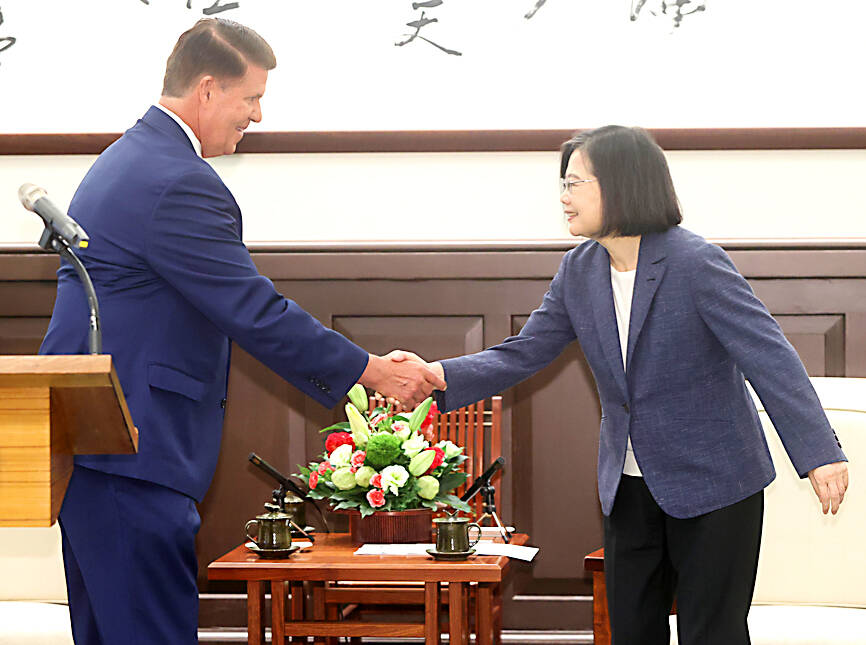Visiting former US undersecretary of state for economic growth, energy and the environment Keith Krach yesterday presented President Tsai Ing-wen (蔡英文) with a Tech Freedom Award in recognition of her contribution to tech diplomacy and commitment to advancing freedom.
As chairman of the Krach Institute for Tech Diplomacy at Purdue and cochair of the Global Tech Security Commission, Krach gave the award to Tsai “on behalf of the Krach Institute and free people everywhere around the world.”
“May our partnership continue to flourish and inspire the world. God bless you, President Tsai. God bless the people of Taiwan. We salute you. We admire you. We honor you with the Tech Freedom Award,” he said.

Photo: CNA
Following his previous trip to Taiwan three years ago as a government official, this time he came “as a friend,” Krach said.
Taiwan and the US have bonded based on common values and were both founded on the belief that “there is no prosperity without freedom,” he said.
Taiwan was at the heart of the US global economic security strategy when he served as undersecretary of state, as it is a beacon of democracy and the embodiment of liberty, has remarkable achievements in technological innovation and is a true friend of the US, Krach added.
The Science and Technology Agreement signed by Taipei and Washington in 2020, and Taiwan Semiconductor Manufacturing Co’s investment in the US “lay a foundation for a future free-trade agreement,” which is “long overdue,” Krach said.
“Technology must advance freedom” is the objective shared by both the institute and the commission, he added.
The commission is tasked by the US Congress to create a global tech security strategy to ensure that “technology serves humanity and isn’t weaponized against us by authoritarian regimes,” he said.
He welcomed Minister of Digital Affairs Audrey Tang (唐鳳) to the commission after she was tapped to be Taiwan’s representative.
Bolstering Taiwan’s prosperity, international standing and sovereignty is “a critical imperative” of the strategy, so the commission is to launch the Taiwan Center for Innovation and Prosperity, he said.
“Without a strong, resilient [and] free Taiwan, freedom everywhere will be imperiled by authoritarianism,” he said.
China is threatened by Taiwan because “free and prosperous Taiwan shatters [Chinese President] Xi Jinping’s [習近平] myth that the Chinese culture cannot thrive as a democracy, but it does,” Krach said.
The US and free countries around the globe stand with Taiwan, not only to demonstrate solidarity among democracies, but also because it is in their economic, technological, scientific and national security interest, he said.
Tsai thanked Krach for his staunch friendship with Taiwan, citing as examples his work to establish the US-Taiwan Economic Prosperity Partnership Dialogue and signing of the Science and Technology Agreement.
Taiwan hopes to further deepen cooperation and exchanges with the US and expedite the signing of an agreement on the avoidance of double taxation, which would create more opportunities for bilateral investment, she said.

Chinese Nationalist Party (KMT) Chairman Eric Chu (朱立倫), spokeswoman Yang Chih-yu (楊智伃) and Legislator Hsieh Lung-chieh (謝龍介) would be summoned by police for questioning for leading an illegal assembly on Thursday evening last week, Minister of the Interior Liu Shyh-fang (劉世芳) said today. The three KMT officials led an assembly outside the Taipei City Prosecutors’ Office, a restricted area where public assembly is not allowed, protesting the questioning of several KMT staff and searches of KMT headquarters and offices in a recall petition forgery case. Chu, Yang and Hsieh are all suspected of contravening the Assembly and Parade Act (集會遊行法) by holding

PRAISE: Japanese visitor Takashi Kubota said the Taiwanese temple architecture images showcased in the AI Art Gallery were the most impressive displays he saw Taiwan does not have an official pavilion at the World Expo in Osaka, Japan, because of its diplomatic predicament, but the government-backed Tech World pavilion is drawing interest with its unique recreations of works by Taiwanese artists. The pavilion features an artificial intelligence (AI)-based art gallery showcasing works of famous Taiwanese artists from the Japanese colonial period using innovative technologies. Among its main simulated displays are Eastern gouache paintings by Chen Chin (陳進), Lin Yu-shan (林玉山) and Kuo Hsueh-hu (郭雪湖), who were the three young Taiwanese painters selected for the East Asian Painting exhibition in 1927. Gouache is a water-based

Taiwan would welcome the return of Honduras as a diplomatic ally if its next president decides to make such a move, Minister of Foreign Affairs Lin Chia-lung (林佳龍) said yesterday. “Of course, we would welcome Honduras if they want to restore diplomatic ties with Taiwan after their elections,” Lin said at a meeting of the legislature’s Foreign Affairs and National Defense Committee, when asked to comment on statements made by two of the three Honduran presidential candidates during the presidential campaign in the Central American country. Taiwan is paying close attention to the region as a whole in the wake of a

OFF-TARGET: More than 30,000 participants were expected to take part in the Games next month, but only 6,550 foreign and 19,400 Taiwanese athletes have registered Taipei city councilors yesterday blasted the organizers of next month’s World Masters Games over sudden timetable and venue changes, which they said have caused thousands of participants to back out of the international sporting event, among other organizational issues. They also cited visa delays and political interference by China as reasons many foreign athletes are requesting refunds for the event, to be held from May 17 to 30. Jointly organized by the Taipei and New Taipei City governments, the games have been rocked by numerous controversies since preparations began in 2020. Taipei City Councilor Lin Yen-feng (林延鳳) said yesterday that new measures by